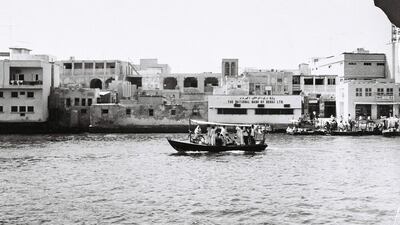In the 42 years since this country was formed, its banks have grown from small players to become the Arab world’s top financial institutions.
"Forty years ago, UAE banking in the Arab world, probably ranked number 15 in size," says Abdul Aziz Al Ghurair, the chief executive of Mashreq and the head of the UAE Banks Federation.
When the central bank restricted the number of branches foreign banks could open in the country to eight in the 1980s, it triggered the growth of local lenders such as National Bank of Abu Dhabi and Emirates Bank International at a time when the likes of the British Bank of the Middle East (acquired by HSBC in 1959) dominated.
This was at a time when Bahrain led the region’s offshore banking scene.
Oil revenue and the emergence of the UAE as a haven amid turbulent parts of the Middle East following the Arab Spring in 2011 have transformed the country's banking industry into the biggest in the region.
And the speedy recovery of the country’s banks in the aftermath of the global financial crisis put them on a stronger footing when competing with ailing western banks left reeling from contraction, regulatory fines and scandals.
“Today, we are the biggest banking centre in total assets by far. That’s a major breakthrough and by strengthening, we will be able to scale up our business in the region,” says Mr Al Ghurair.
“More and more local banks are becoming bigger because we’ve seen foreign banks exiting. They’ve seen the competition from local banks. It’s becoming difficult for banks that don’t have scale.”
After the country came into being in 1971, a currency board was created two years later to replace the Bahraini dinar, and the Qatari and Dubai riyal that were in use, with a single currency. It took another eight years, however, for a central bank to be created to regulate the flourishing sector.
Since the central bank was established in 1980, total bank assets in this country ballooned to US$1.6 trillion at the end of 2010 from $28.5 billion in 1980, according to data from the bank.
So crowded has the UAE financial sector now become, with 23 domestic banks and 28 foreign ones, that mergers and acquisitions as well as beefing up presence beyond the country’s borders may be the only realistic options for the industry.
“I think if we want to compete better and we have to have a bigger role in the market, we need to have some mergers in the future,’’ says Abdulla AbdulRaheem, the deputy chief executive of National Bank of Abu Dhabi. “We used to have more than 30 or 40 branches when I joined in 1982 but now we have more than 100 branches.
“I remember when I was a child going to school we had only a few local banks and mostly foreign banks like the Middle East bank. There is a chance now for the local banks more than the international banks, but it is tough competition.”
This year, First Gulf Bank, a lender based in the capital, has bought Dubai First, a consumer loan and credit card company, for Dh601 million from Dubai Group, an investment vehicle owned by Dubai. First Gulf Bank is also planning to open offices in South Korea, China and Indonesia.
Meanwhile, foreign banks are scaling back, finding it increasingly difficult to compete in such a bustling market, especially in consumer banking.
Barclays, the London-based bank, put its retail banking unit here up for sale this year in a move that may result in the loss of 280 jobs while its British rival Lloyds sold its retail and commercial businesses to HSBC last year.
The financial landscape here is also changing with Islamic banks, which adhere to a proscription against interest, getting a bigger share of the market. Islamic banks are set to more than double their current 20 per cent share of the market within the next 10 years, says Hussain Al Qemzi, Noor Islamic Bank’s chief executive.
That has prompted Abu Dhabi Islamic Bank (Adib), the biggest Islamic bank in the emirate, to expand its presence in Dubai in the past year and a half, while Noor Islamic Bank is increasing its efforts to attract more foreign customers with products such as mortgages for non-UAE residents.
Adib recently hired the long-time Citibank executive Phil King to make Islamic banking more appealing to non-Muslims who have become disillusioned with conventional lenders in the aftermath of the 2008 financial crisis.
The bank is enticing non-Muslim clients by promoting the ethical appeal of Islamic banking, which is said by its backers to offer more visibility in the pricing of its products and no hidden fees among other attributes.
“In the last few decades, banks in the UAE have played an active part in channelling savings into productive activities and made a huge contribution to the overall economic development through value creation and generation of employment,” Mr King said.
“As financial institutions all over the world felt the impact of the global financial crisis, banks in the UAE remained resilient and emerged stronger.”
mkassem@thenational.ae

